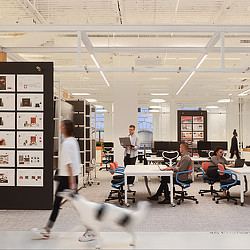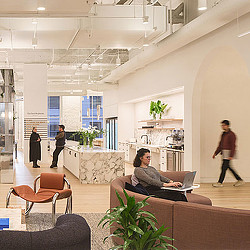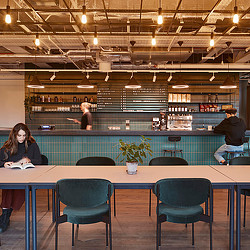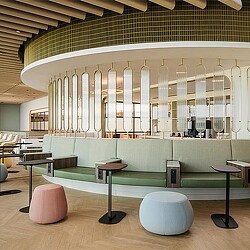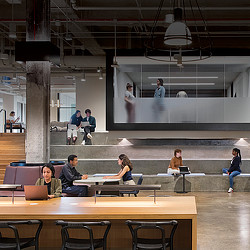Face-to-Face Work and Aging Building Stock – How Can We Make Sense of French Workers’ Contradictory Attitude Towards Their Office?
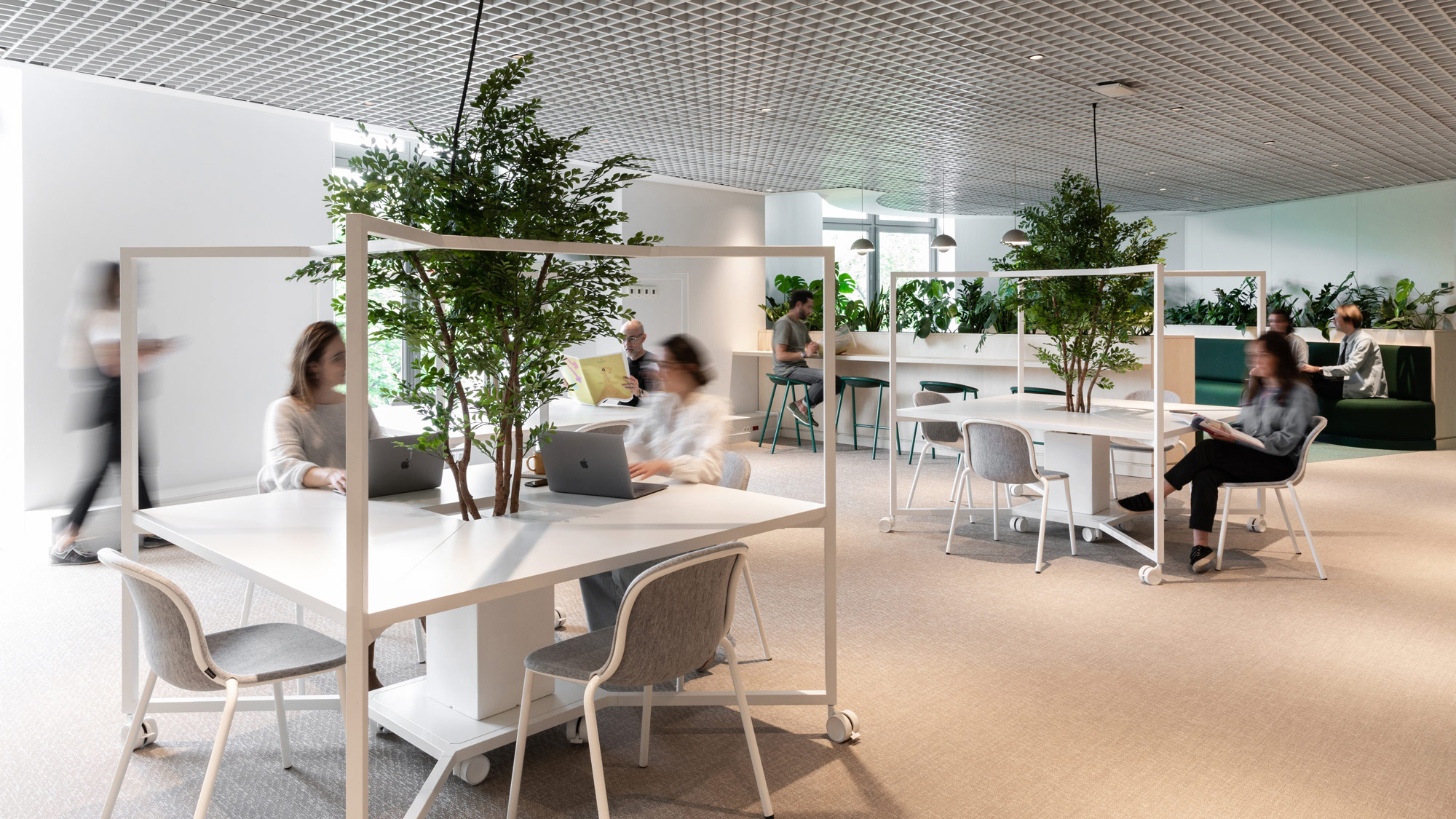
A French paradox
There is an inextricable paradox in the attitude of French workers towards their workspaces.
On the one hand, even though it is widely acknowledged that the pandemic has irrevocably changed our working habits, France, which often stands out for its refusal to follow global trends, has not been an exception to the rule and retains a strong attachment to the workplace, even after years of upheaval in our working habits.
However, the notorious lack of investment, the ageing state of France's tertiary sector and the low rate of building renewal would seem to indicate otherwise.
If the French seem so inclined to work face-to-face, why don't companies give themselves the means to accommodate them in workspaces worthy of the name and adapted to the working practices of their employees? Let's look at the figures and try to unravel this paradox.
The attachment to face-to-face work
For more than 20 years, the Gensler Research Institute has been carrying out an in-depth analysis of workspaces and working practices, which it publishes in its Global Workplace Survey. The report, which is global in scope yet breaks down results country by country, was recently published in its translated version focusing on France.
What do we learn about French practices? The findings that have been gradually emerging since 2020 have been confirmed: the French are more attached to working face-to-face than in other countries, and the workplace is more highly valued in France than elsewhere. In fact, on par with Japan, France is the country in the study with the highest proportion of time spent in the office, at 60% compared with a world average of 51%.
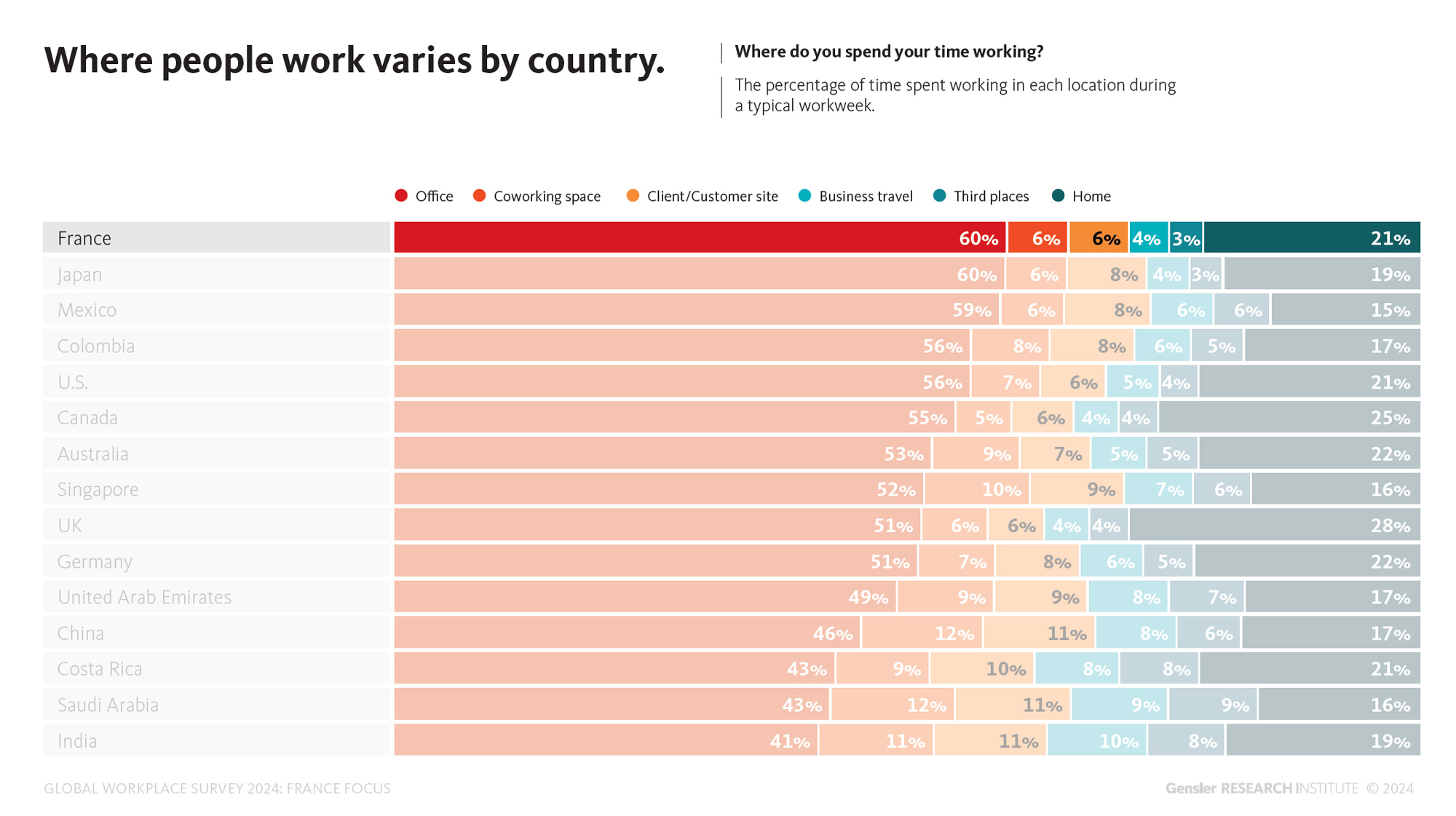
The main reasons given by the respondents to explain this attachment to the workplace are conviviality between colleagues (60%), team meetings (46%), concentration on work (43%), and being present with one's team (43%).
The potential benefits of post-pandemic hybrid working practices have therefore not convinced French workers, who spend only 21% of their working time at home, compared with 28% for British workers, for example. As far as new alternative workplaces are concerned, the findings remain the same: the French spend 6% of their working time in coworking spaces, compared with 12% in China, for example, and just 3% in third places — almost three times less than in India.
So it seems clear that the French enjoy coming to the office, and neither the pandemic nor even technological advances seem likely to change this trend.
An ageing and poorly adapted tertiary sector stock
Despite this observation, a number of indicators on the quality and renewal of France's tertiary building stock paint a worrying picture, which contrasts sharply with the attachment the French feel for their workplace.
Firstly, there is the notorious age of the buildings. According to a report by the French Ministry for Ecological Transition, 79% of offices in France are more than 20 years old, and more than half of these were built before 1980. These buildings are often poorly adapted to modern standards of thermal and acoustic comfort and indoor air quality, which has a negative impact on the quality of office use and therefore on worker productivity.
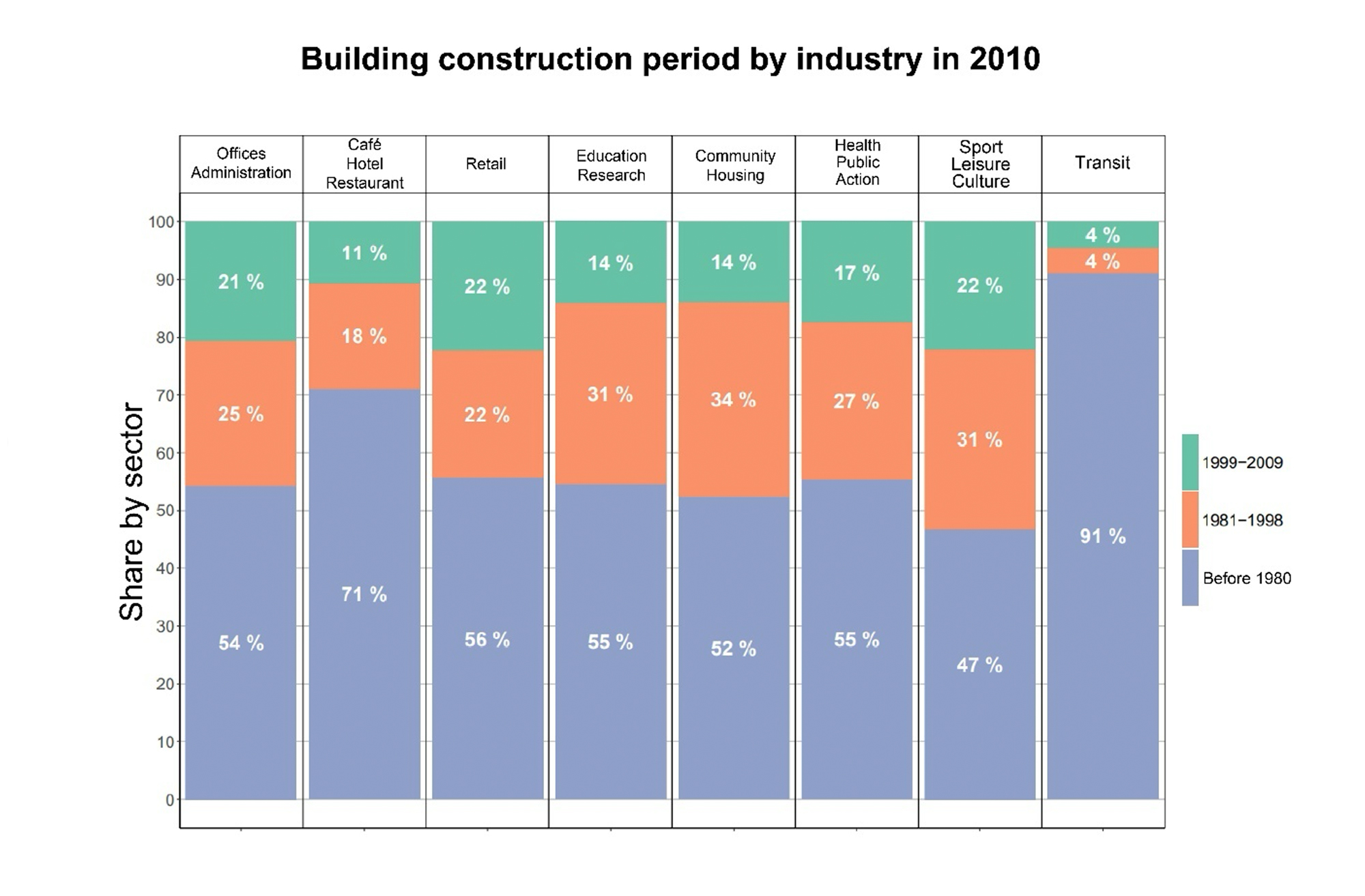
Then there are the regulatory constraints. Recently, the ‘tertiary sector decree’ made it compulsory to substantially reduce the energy consumption of buildings over 1,000 m² by 2030, but compliance is still a challenge for many landlords, and renovation work is progressing too timidly.
Finally, there is the obsolescence of office buildings. The office vacancy rate in Paris and the surrounding region has stabilised at around 7%, but a significant proportion of empty offices are considered obsolete, meaning they require major renovation to become attractive again.
This lack of enthusiasm for renewing office space is clearly reflected in historically low investment rates. In the Paris region office market, for example, only €1 billion was invested in the first half of 2024, the lowest level recorded in the first two quarters since 2009.
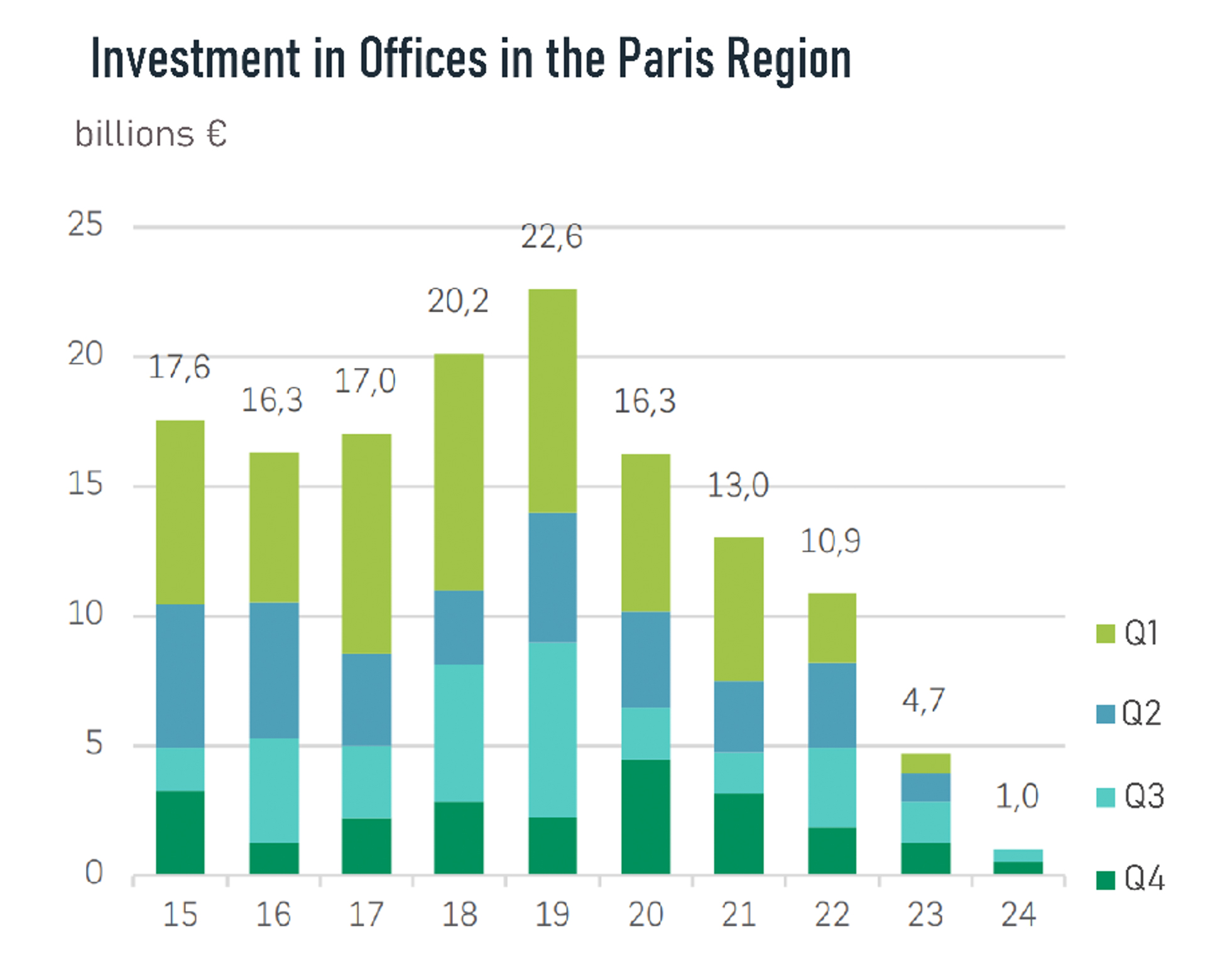
Lost productivity
The slow pace of renovation in the service sector is also having an impact on worker productivity. The Global Workplace Survey ranks French workers among the least productive in the study, with a score of 63, some ten points below the world average.
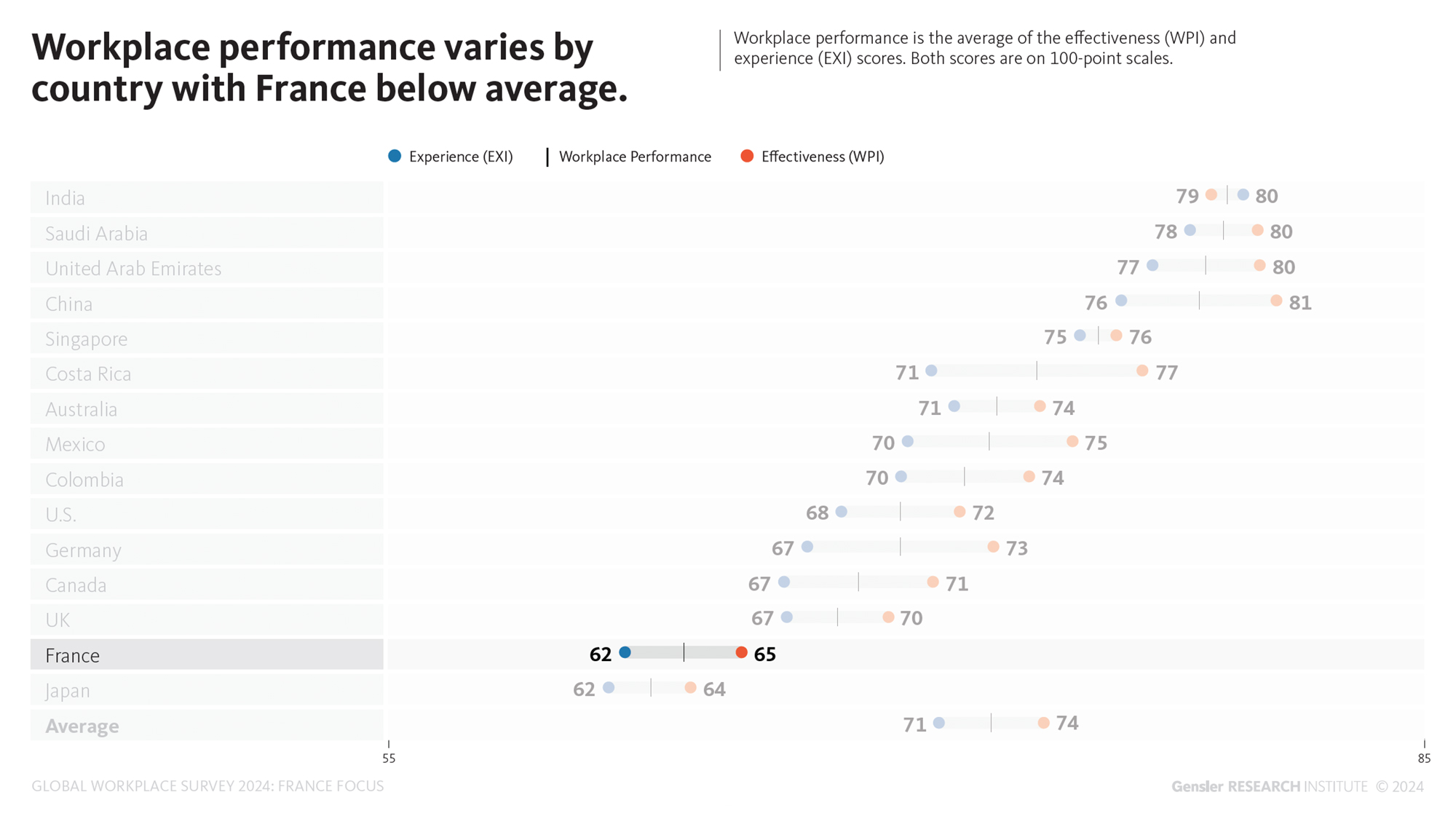
The quality of office buildings is always positively correlated with job satisfaction, a sense of pride, and loyalty to the company — all of which are determining factors for worker productivity. For example, our study shows that 82% of workers in high-quality buildings say they speak positively about their company, compared with only 47% of workers in low-quality buildings.
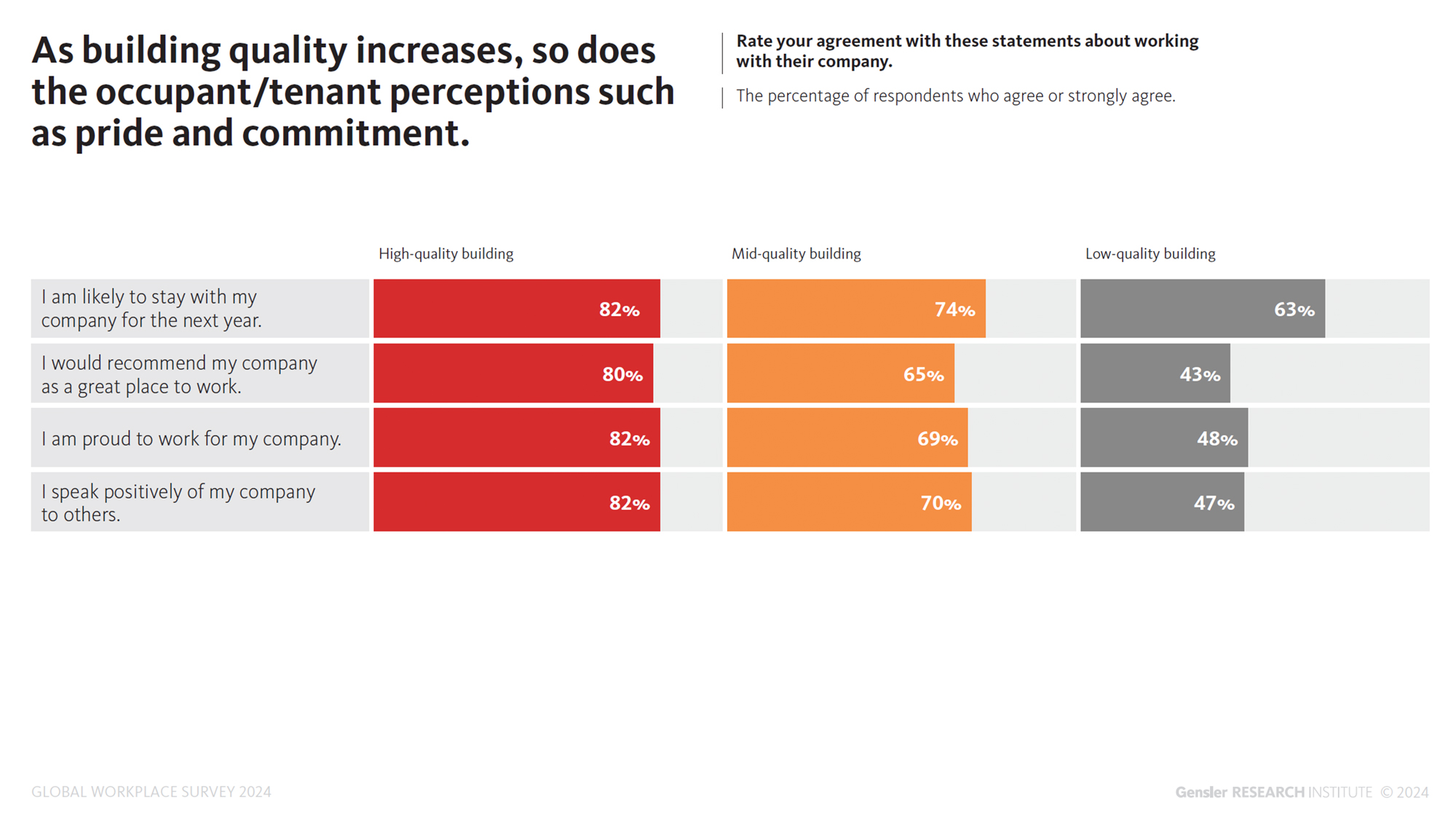
Beyond being amused by this contradiction, it would appear that the French paradox between a preference for face-to-face work and the low quality of tertiary buildings is having deleterious consequences for companies and their employees, which is why it is so important to tackle this problem now.
Giving ourselves the means to achieve our ambitions
Yet there is no shortage of solutions. For more than four years, Gensler's Paris office has been renovating office spaces while incorporating the specific features of French working habits into our designs. For example, the desire of certain clients to strengthen links within their teams has led to a greater proportion of collaborative workspaces. Similarly, after consulting a occupancy survey, one of our projects revised the number of workstations upwards.
Where many might see France as lagging behind in the inevitable transition to a hybrid working model, the French penchant for staying in the office represents a huge opportunity, but only if companies decide to give themselves the means to achieve their ambitions. Office space is the second biggest expense for companies after human resources. However, the erratic pace set by the hybrid working model is leaving companies uncertain as to the right real estate strategy to adopt in order to avoid under-utilisation of their premises, and hence significant financial loss. As France is relatively unaffected by this phenomenon, decision-makers should be reassured as to the real impact in terms of productivity that renovating their workspaces could generate.
For media inquiries, email .
Entre attachement au présentiel et parc immobilier vieillissant — comment comprendre l’attitude contradictoire des travailleurs Français envers leurs bureaux?

Un paradoxe Français
Il existe dans l’attitude des travailleurs Français envers leurs espaces de travail un paradoxe inextricable.
D’un côté, même si l’on ne cesse de constater que la pandémie a irrémédiablement bouleversé nos habitudes de travail, la France, elle qui souvent se démarque par son refus de suivre les tendances mondiales, n’a pas fait exception à la règle et garde un fort attachement au lieu de travail, et ce même après des années de bouleversements dans nos habitudes de travail.
Pourtant, le manque notoire d’investissement, l’état vieillissant du parc tertiaire Français et le faible taux de renouvellement du bâti semble indiquer le contraire.
Si les Français semblent si enclins à travailler en présentiel, pourquoi est-ce que les entreprises ne se donnent pas les moyens de les accueillir dans des espaces de travail dignes de ce nom et adaptés aux pratiques de travail de ses salariés ? Sortons les chiffres et essayons de détricoter ce paradoxe.
L’attachement au travail en présentiel
Depuis plus de 20 ans, l’institut de recherche de Gensler s’adonne chaque année à une analyse fine des espaces et pratiques de travail, qu’elle publie dans son étude Global Workplace Survey. De portée mondiale, tout en décomposant les résultats pays par pays, le rapport se concentrant sur la France a été récemment publié dans sa version traduite.
Qu’apprend-t-on sur les pratiques françaises ? Le constat qui se dessinait progressivement depuis 2020 se confirme : les Français sont plus attachés à travailler en présentiel que dans d’autres pays et la valorisation du lieu de travail y est plus marquée qu’ailleurs. En effet, ex aequo avec le Japon, la France est le pays de l’étude dont la proportion de temps passé au bureau est la plus élevée, à 60% par rapport à une moyenne mondiale de 51%.
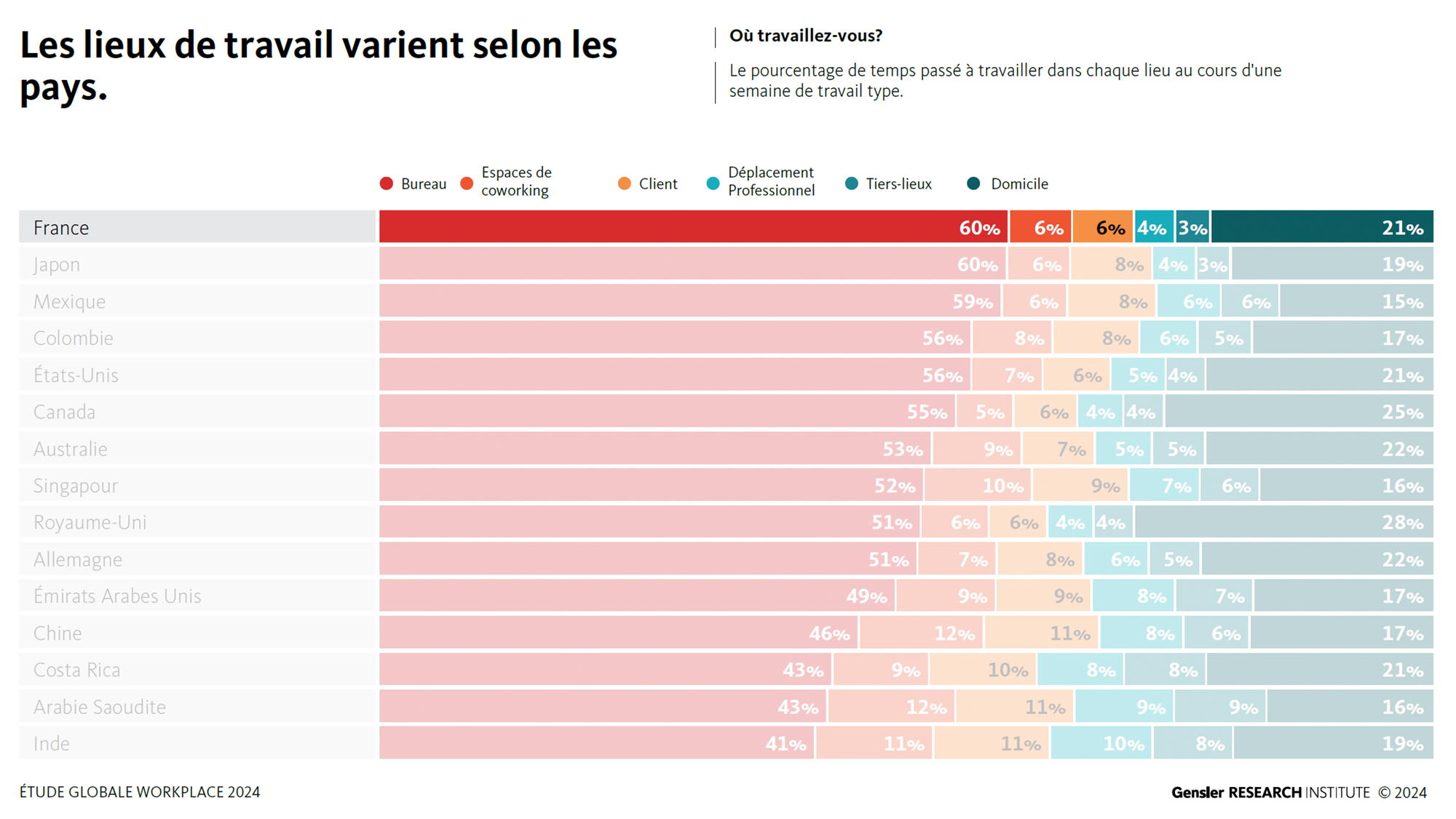
Les raisons principales avancées par les sondés pour expliquer cet attachement au lieu de travail sont la convivialité entre collègues (60 %), les réunions d’équipe (46 %), la concentration sur son travail (43 %) et le fait d’être présent auprès de son équipe (43 %).
Les avantages potentiels des pratiques de travail hybrides post-pandémie n’ont donc pas convaincu les travailleurs Français, qui ne passent que 21 % de leur temps de travail à domicile, contre par exemple 28 % pour les travailleurs britanniques. Du côté des nouveaux lieux de travail alternatifs, le constat reste le même : les Français passent 6 % de leur temps de travail dans des espaces de coworking, contre par exemple 12 % en Chine et seulement 3 % dans des tiers-lieux, soit presque trois fois moins qu’en Inde.
Il paraît donc évident que les Français apprécient se rendre au bureau et ni la pandémie, ni même les avancées technologiques ne semblent pouvoir infléchir cette tendance.
Un parc tertiaire vieillissant et mal adapté
Malgré ce constat, plusieurs indicateurs sur la qualité et le renouvellement du bâti tertiaire en France dépeignent une situation préoccupante, qui contraste fortement avec l’attachement des Français pour leur lieu de travail.
D’abord, il y a l’ancienneté notoire des bâtiments. En effet, selon un rapport du ministère de la transition écologique, 79 % des bureaux en France ont plus de 20 ans, dont plus de la moitié ayant été construits avant 1980. Ces bâtiments sont souvent mal adaptés aux standards modernes de confort thermique, acoustique, et de qualité de l'air intérieur, ce qui impacte négativement la qualité d’usage des bureaux et donc la productivité des travailleurs.
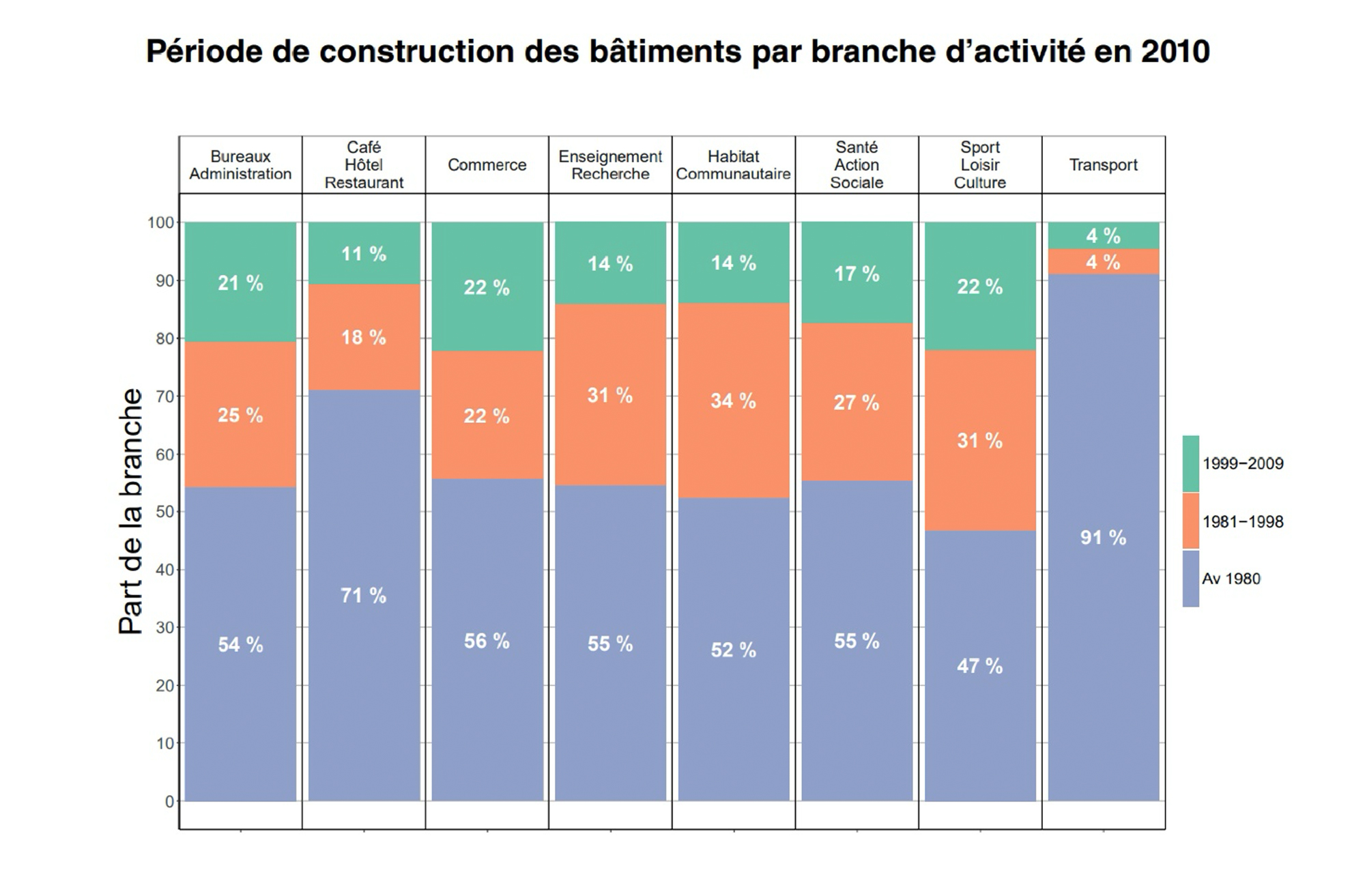
Ensuite, il y a les contraintes réglementaires. Depuis récemment, le ‘décret tertiaire’ impose de substantiellement réduire la consommation énergétique des bâtiments de plus de 1 000 m² d'ici 2030, mais la mise en conformité reste encore un défi pour de nombreux propriétaires et les rénovations n’avancent que trop timidement.
Enfin, il y a l’obsolescence des immeubles de bureaux. Le taux de vacance des bureaux en Île-de-France s'est stabilisé autour de 7 %, mais une part importante des bureaux vides est considérée comme obsolète, c'est-à-dire nécessitant d’importantes rénovations pour être à nouveau attractifs.
Ce manque d’entrain pour renouveler les espaces de bureaux est clairement exprimé par les taux d’investissements historiquement bas. Sur le marché tertiaire francilien par exemple, seulement 1 milliard d’euros a été investi durant la première moitié de 2024, ce qui représente le niveau enregistré aux deux premiers trimestres le plus bas depuis 2009.
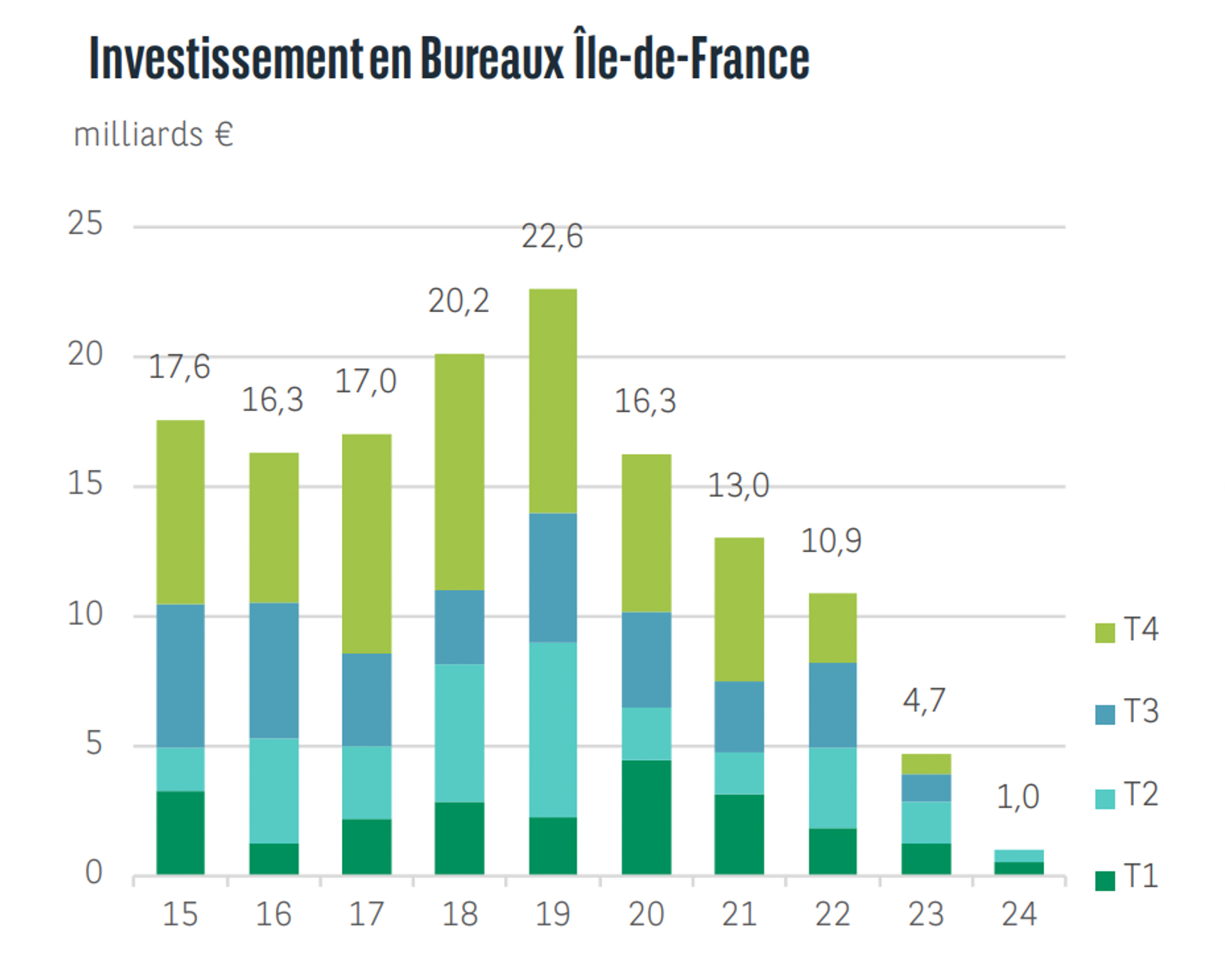
Un manque à gagner de productivité
Cette lente et faible rénovation du parc tertiaire n’est pas sans conséquences sur la productivité des travailleurs. Le Global Workplace Survey place les travailleurs Français parmi les moins productifs de l’étude avec un score de 63, soit une dizaine de points en dessous de la moyenne mondiale.
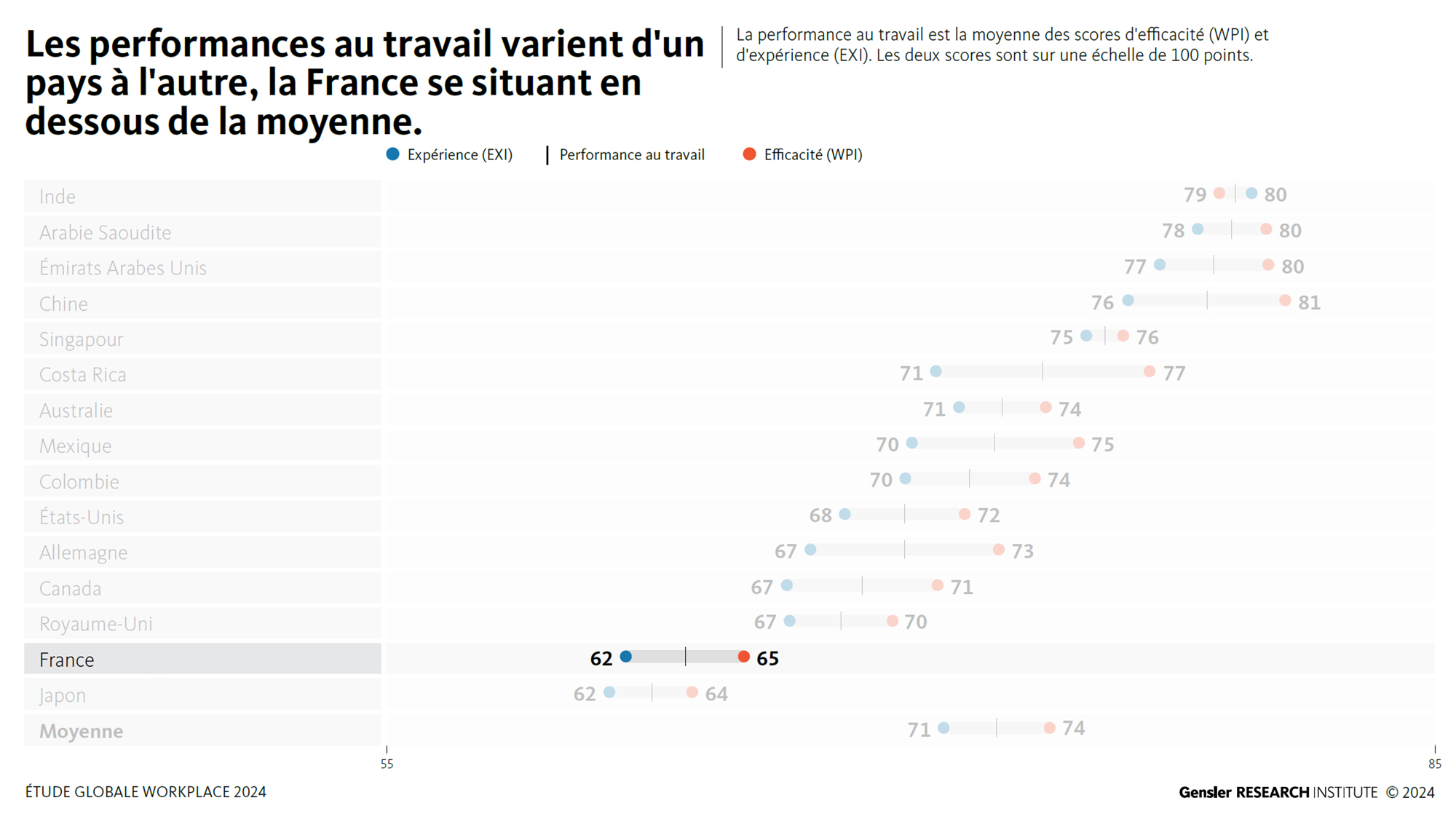
La qualité des immeubles de bureaux est toujours positivement corrélée avec la satisfaction au travail, le sentiment de fierté, et la fidélité envers l’entreprise ; d’autant plus de facteurs déterminants pour la productivité des travailleurs. Par exemple, notre étude indique que 82 % des travailleurs dans des immeubles de haute qualité affirment parler de leur entreprise en des termes positifs, contre seulement 47 % pour des travailleurs dans des bâtiments de faible qualité.
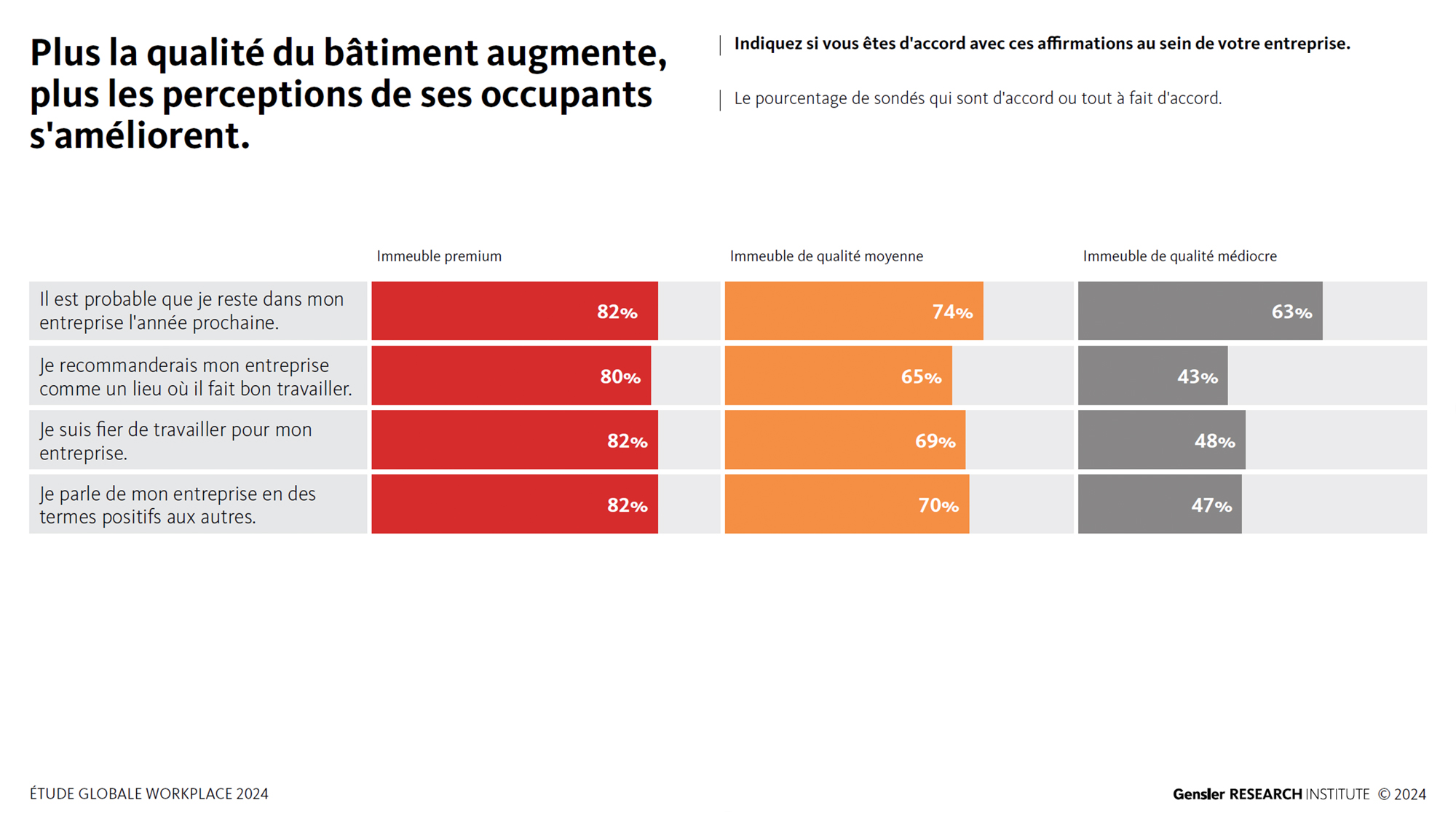
Au-delà de s’amuser de cette contradiction, il apparaît que le paradoxe Français entre préférence pour le présentiel et faible qualité du bâti tertiaire entraîne des conséquences délétères pour les entreprises et ses travailleurs, d’où l’importance de se saisir de ce problème maintenant.
Se donner les moyens de ses ambitions
Les solutions ne manquent pourtant pas. Depuis plus de quatre ans, l’agence parisienne de Gensler s’atèle à la rénovation d’espaces de bureaux tout en incorporant dans nos designs les spécificités des habitudes de travail Françaises. Par exemple, la volonté de certains clients à renforcer les liens au sein des équipes a mener à une proportion plus grandes d’espaces de travail collaboratifs. De même, après avoir consulté une enquête de fréquentation, l’un de nos projets a revu le nombre de postes de travail à la hausse.
Là où beaucoup pourraient voir un retard de la France à entamer la transition inévitable vers un modèle de travail hybride, le tropisme Français pour rester au bureau représente une chance inouïe, mais seulement si les entreprises décident de se donner les moyens de leurs ambitions. Les espaces de bureaux représentent le deuxième poste de dépense des entreprises derrière les ressources humaines. Or le rythme erratique impulsé par le modèle de travail hybride plonge les entreprises dans l’incertitude quant à la bonne stratégie immobilière à adopter pour éviter une sous-utilisation de leurs locaux et donc une perte financière importante. La France étant relativement peu touché par ce phénomène, les dirigeants devraient être rassurés quant à l’impact réel en termes de productivité qu’une rénovation de leurs espaces de travail pourrait générer.
For media inquiries, email .

